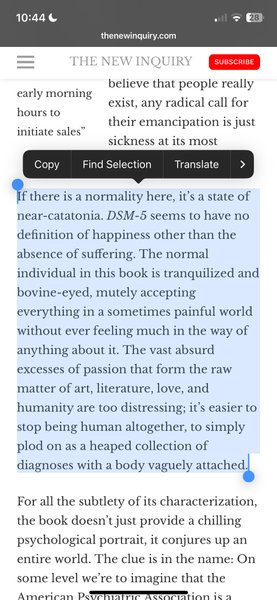Sublime
An inspiration engine for ideas
A psychiatrist colleague once told me that patients with psychosis don’t stop believing in their delusions, they just lose interest in them.
Suzanne Koven • Letter to a Young Female Physician: Notes from a Medical Life
actuellement, aucun traitement psychiatrique n’est résolutif, sauf celui de la maniaco-dépression pour laquelle une prise quotidienne d’un thymorégulateur – c’est-à-dire un stabilisateur de l’humeur – est nécessaire, le plus utilisé étant le lithium. Il s’agit donc d’un traitement à vie qui, dans l’esprit du patient, n’est justifié que dans la
... See moreJacques Antoine MALAREWICZ • La Folie Dans Tous Ses États


Insanity is not a “regrettable . . . accident” but the “indispensable catalyst” of genius.
Nassir Ghaemi • A First-Rate Madness: Uncovering the Links Between Leadership and Mental Illness
The unlucky, who, early in their lives, endure hardships and tragedies—or the challenge of mental illness—seem to become, not infrequently, our greatest leaders.
Nassir Ghaemi • A First-Rate Madness: Uncovering the Links Between Leadership and Mental Illness

